
|
You entered: Earth
 Asteroid 1998 WT24 Passes Near Earth
Asteroid 1998 WT24 Passes Near Earth
23.12.2001
Last week, an asteroid approached unusually close to the Earth. Passing well outside the orbit of our Moon, Asteroid 1998 WT24 posed no danger, but became bright enough to see with binoculars and to track with radar. Pictured above, the kilometer-sized asteroid was imaged crossing the sky on December 14, two days before closest approach.
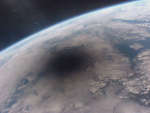 Looking Back at an Eclipsed Earth
Looking Back at an Eclipsed Earth
1.01.2011
Here is what the Earth looks like during a solar eclipse. The shadow of the Moon can be seen darkening part of Earth. This shadow moved across the Earth at nearly 2000 kilometers per hour.
 A Crescent Earth At Midnight
A Crescent Earth At Midnight
6.10.1996
The Earth's northern hemisphere appears outlined as a sunlit crescent in this dramatic view from the GOES 8 satellite. The image was made near midnight for the Geostationary Operational Environmental Satellite on June 22 this year, two days after the Summer Solstice.
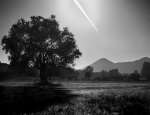 The Moon Entering Earth s Shadow
The Moon Entering Earth s Shadow
8.10.2015
On September 27/28, from all over the planet's nightside moon watchers enjoyed a total lunar eclipse. The dramatic celestial spectacle was widely imaged, but this lunar eclipse picture may look a little strange and unfamiliar, made with a point and shoot camera of a bygone era.
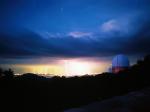 Lightning on Earth
Lightning on Earth
18.08.2004
Nobody knows what causes lightning. It is known that charges slowly separate in some clouds causing rapid electrical discharges (lightning), but how electrical charges get separated in clouds remains a topic of much research.
 Fire on Earth
Fire on Earth
1.09.2013
Sometimes, regions of planet Earth light up with fire. Since fire is the rapid acquisition of oxygen, and since oxygen is a key indicator of life, fire on any planet would be an indicator of life on that planet.
 Earth at Night
Earth at Night
26.11.2000
This is what the Earth looks like at night. Can you find your favorite country or city? Surprisingly, city lights make this task quite possible. Human-made lights highlight particularly developed or populated areas of the Earth's surface, including the seaboards of Europe, the eastern United States, and Japan.
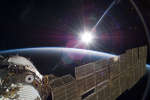 Bright Sun and Crescent Earth from the Space Station
Bright Sun and Crescent Earth from the Space Station
29.11.2009
This was just one more breathtaking view from the International Space Station. The Sun, a crescent Earth, and the long arm of a solar panel were all visible outside a window when the Space Shuttle Atlantis visited the orbiting outpost last week. Reflections from the window and hexagonal lens flares from the camera are superposed.
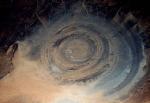 Earth's Richat Structure
Earth's Richat Structure
8.10.2000
What on Earth is that? The Richat Structure in the Sahara Desert of Mauritania is easily visible from space because it is nearly 50 kilometers across. Once thought to be an impact crater, the Richat Structure's flat middle and lack of shock-altered rock indicates otherwise.
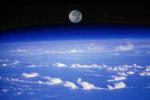 Moonset, Planet Earth
Moonset, Planet Earth
21.09.2002
During the Astro-1 astronomy mission of December, 1990, Space Shuttle astronauts photographed this stunning view of the setting full moon poised above the Earth's limb. In the foreground, towering clouds of condensing water vapor mark the extent of the troposphere, the lowest layer of the planet's life-sustaining atmosphere.
|
January February |
|||||||||||||||||||||||||||||||||||||||||||||||||